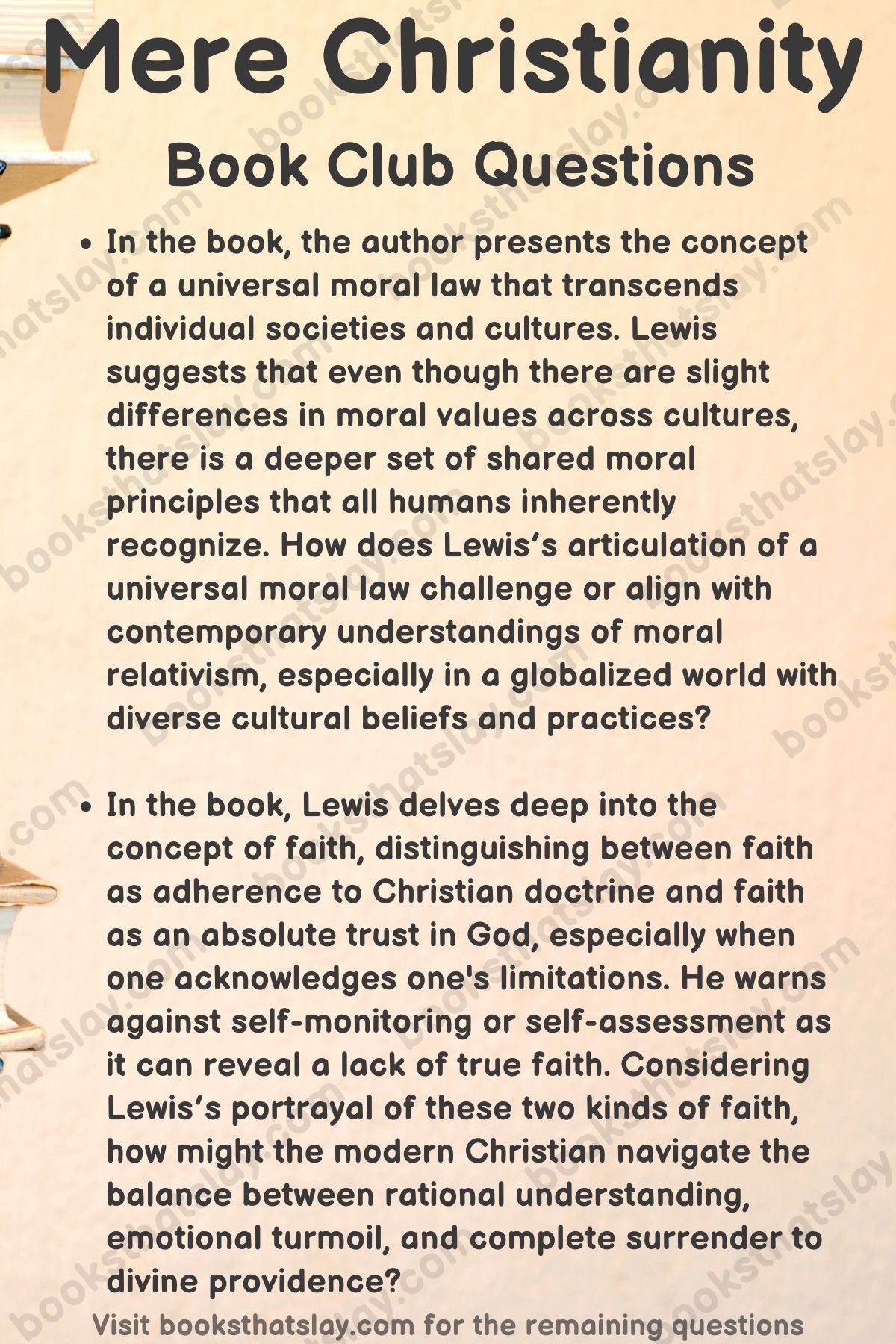10 Mere Christianity Discussion Questions
C. S. Lewis’s “Mere Christianity” is a journey that weaves through the intricate corridors of faith, morality, and the profound mysteries of Christian theology. Whether you’ve read the book several times or are just acquainting yourself with its profound insights, there’s an undeniable depth to Lewis’s arguments that calls for contemplation.
Beyond its eloquent prose lies a trove of philosophical and theological questions that challenge, provoke, and inspire.
In this blog post, we are about to embark on an intellectual expedition, dissecting some of the most thought-provoking discussion questions that can make your book club meets much more engaging among your peers.
Whether you’re a seasoned theologian, a curious skeptic, or someone in between, these questions will ignite a spark of introspection and perhaps lead you to view Lewis’s masterpiece in a new light.
Let’s dive in!

Mere Christianity Discussion Questions
- Lewis presents the argument that most humans possess an innate sense of right and wrong and that the essence of this moral code is relatively universal, albeit with some cultural variances. He suggests that while this moral law seems objective, humans are not beholden to it because of their free will.
Considering Lewis’s assertion, how does the concept of an innate moral law coexist with the vast diversity of cultural and moral beliefs across different societies, and how might one reconcile the universality of this moral code with the evident moral relativism present in different cultures? - In the book, the author presents the concept of a universal moral law that transcends individual societies and cultures. Lewis suggests that even though there are slight differences in moral values across cultures, there is a deeper set of shared moral principles that all humans inherently recognize. How does Lewis’s articulation of a universal moral law challenge or align with contemporary understandings of moral relativism, especially in a globalized world with diverse cultural beliefs and practices?
- Lews says that Pantheism and Christianity are contrasted with respect to their views on God. Pantheists see God as both good and evil, with our perceptions of these concepts being merely limitations of our understanding, while Christians view God as infinitely good, with evil being a perversion of inherent goodness.
Given these distinct views, how does Lewis reconcile the presence of profound evil in the world with the Christian belief in an infinitely good God, and what implications does this have for one’s understanding of God’s nature and role in human suffering? - Given the tumultuous backdrop of World War II during which C.S. Lewis formulated much of “Mere Christianity”, his emphasis on forgiveness, even in the face of grave atrocities, stands out starkly. He posits that harboring resentment and hatred distorts one’s character and distances them from God, emphasizing the transformative power of forgiveness for both the forgiver and the forgiven.
In what ways does Lewis’s perspective on forgiveness resonate with or diverge from your own understanding or experiences, particularly when considering forgiving those who might have committed heinous acts against oneself or one’s community? - The narrative of Christianity, as described by Lewis, is centered on the idea of the Son of God, Jesus Christ, taking on humanity’s sins, implying that only through divine intervention can the vastness of human sin be addressed. This presents a stark contrast with certain philosophical beliefs that emphasize human agency and responsibility for redemption.
How might Lewis’s argument be perceived in the light of philosophical beliefs that stress the importance of human autonomy in moral redemption, and how does the Christian narrative affect an individual’s perception of personal responsibility and agency? - In the book, Lewis delves deep into the concept of faith, distinguishing between faith as adherence to Christian doctrine and faith as an absolute trust in God, especially when one acknowledges one’s limitations. He warns against self-monitoring or self-assessment as it can reveal a lack of true faith.
Considering Lewis’s portrayal of these two kinds of faith, how might the modern Christian navigate the balance between rational understanding, emotional turmoil, and complete surrender to divine providence? - The book delves deep into the virtues that Christians ought to practice, highlighting both the Theological and Cardinal virtues. Lewis emphasizes pride as the root of all sins and provides a deep exploration of virtues such as chastity and justice.
Drawing from Lewis’s exploration of these virtues, how do they intertwine with the modern societal constructs and challenges, and in what ways do contemporary interpretations of these virtues either align with or deviate from Lewis’s understanding? - For Lewis, pride stands out as the most detrimental sin, representing a state of mind that is in complete opposition to God. He explains that pride is not only the belief in one’s self-sufficiency but also the illusion of superiority over others, leading to a wide array of other sins.
In today’s context, where self-confidence and individualism are often celebrated, how can Lewis’s perspective on pride be reconciled with the modern emphasis on self-worth and individual achievements? - Towards the end of Mere Christianity, Lewis explores the intricate concept of the Holy Trinity and God’s existence beyond linear human time. This idea challenges our typical human understanding and perceptions of time and space.
Given this complex theological perspective, how might one grapple with and internalize the idea of a God that exists outside our linear conception of time, and what implications does this hold for our understanding of human existence, purpose, and the afterlife? - Throughout the book, Lewis emphasizes that Christian morality is much more profound than the innate human sense of right and wrong. He believes that our consciences are remnants of a time before humanity’s fall, indicating a need for deeper moral guidance and transformation.
Drawing from Lewis’s differentiation between innate moral tendencies and Christian ethics, how can individuals, whether Christian or not, navigate the complexities of moral decision-making in contemporary society?
Check out posts from other topics